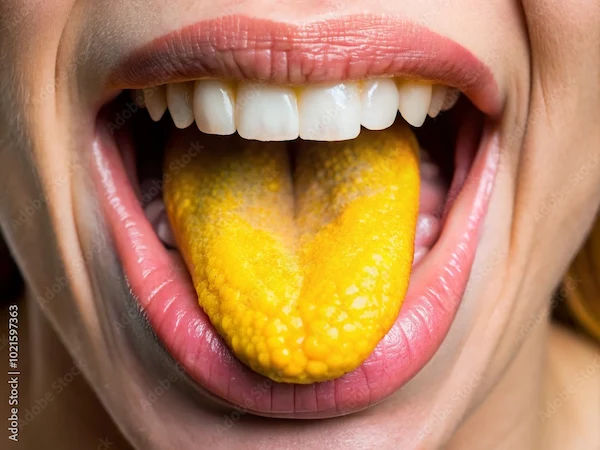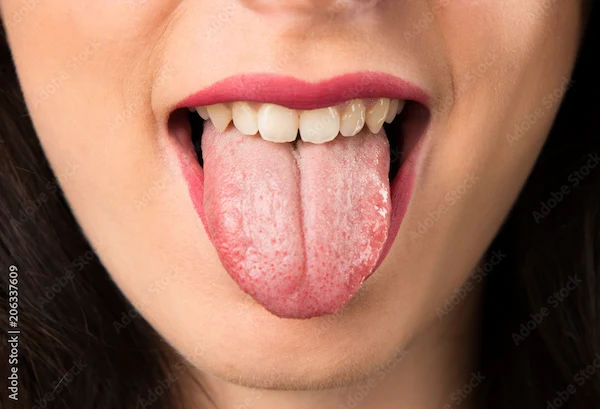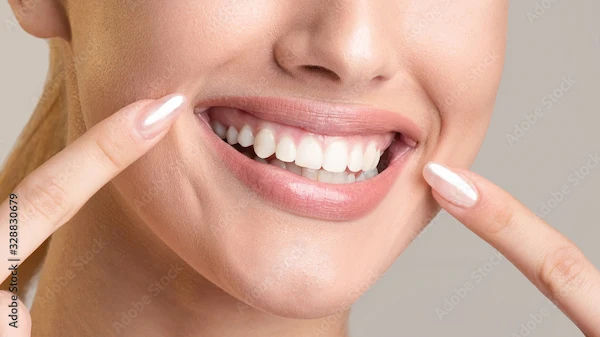Understanding Yellow Tongue: Causes, Symptoms, and Treatment
Discover the causes, symptoms, and treatments for yellow tongue. Learn how oral hygiene, diet, and health conditions can affect your tongue and when to see a doctor.

Written by Dr.Sonia Bhatt
Last updated on 3rd Jul, 2025

Your tongue is a powerful muscle that helps you speak, chew, and taste your favourite foods. But did you know it can also give you clues about your health? A healthy tongue is typically pink and covered with tiny bumps called papillae. However, if you notice your tongue turning yellow, it might be a sign that something isn’t quite right. While a yellow tongue is often harmless and temporary, it can sometimes indicate an underlying issue that needs attention.
In this blog, we’ll explore what yellow tongue is, its common causes, symptoms to watch out for, and how to treat or prevent it. By the end, you’ll have a better understanding of this condition and know when it’s time to see a doctor.
What is Yellow Tongue?
Yellow tongue is a condition where the surface of your tongue develops a yellow coating or discolouration. This happens when dead skin cells, bacteria, or other substances build up on the papillae, the tiny bumps on your tongue. Normally, these papillae are pinkish, but when debris accumulates, they can appear yellow.
It’s important to note that a yellow tongue isn’t always a cause for concern. In many cases, it’s temporary and can be resolved with simple changes to your oral hygiene routine. However, in some instances, it may signal an underlying health issue that requires medical attention.
Common Causes of Yellow Tongue
Yellow tongue can be caused by a variety of factors, ranging from harmless habits to more serious health conditions. Here are some of the most common causes:
1. Poor Oral Hygiene
If you don’t brush or clean your tongue regularly, bacteria, food particles, and dead skin cells can build up on its surface. This can lead to a yellow coating.
2. Dehydration
When you’re dehydrated, your body produces less saliva. Saliva helps wash away bacteria and debris from your tongue. Without enough saliva, bacteria can thrive, leading to discolouration.
3. Smoking or Tobacco Use
Smoking or using tobacco products can stain your tongue yellow. It can also contribute to bacterial growth, making the discolouration more noticeable.
4. Dietary Factors
Certain foods and drinks, such as coffee, tea, and spices like turmeric, can stain your tongue yellow. Highly processed foods and those high in sugar can also promote bacterial growth.
5. Oral Thrush
Oral thrush is a fungal infection caused by an overgrowth of Candida yeast. It can cause white or yellow patches on the tongue and inside the mouth.
6. Geographic Tongue
This is a harmless condition where patches on the tongue lose their papillae, creating a map-like appearance. Sometimes, these patches can appear yellow.
7. Medications
Some medications, particularly antibiotics, can disrupt the balance of bacteria in your mouth, leading to discolouration.
8. Jaundice
Jaundice is a condition where the skin and whites of the eyes turn yellow due to high levels of bilirubin in the blood. It can also cause the tongue to appear yellow and may indicate liver or gallbladder problems.
9. Dry Mouth (Xerostomia)
A lack of saliva, often caused by certain medications or medical conditions, can lead to bacterial overgrowth and a yellow tongue.
Symptoms Associated with Yellow Tongue
A yellow tongue is usually easy to spot, but it can come with other symptoms depending on the cause. These may include:
A yellow or yellowish-white coating on the tongue.
Bad breath (halitosis).
A metallic or bitter taste in the mouth.
A thick or furry texture on the tongue.
Soreness or irritation in some cases.
If you notice any of these symptoms, it’s a good idea to assess your oral hygiene habits and consider whether any lifestyle factors might be contributing to the issue.
When to See a Doctor?
In most cases, yellow tongue is harmless and can be resolved with improved oral care. However, there are times when it’s best to consult a healthcare professional:
If the yellow coating persists despite good oral hygiene.
If you experience additional symptoms like fever, pain, or swelling.
If you notice signs of jaundice, such as yellowing of the skin or eyes.
If you’re concerned about an underlying health condition.
A doctor can help determine whether your yellow tongue is a sign of something more serious and recommend appropriate treatment. If you visit a doctor for yellow tongue, they will likely start with a physical examination of your mouth and tongue. They may also ask about your medical history, diet, and lifestyle habits. In some cases, they might recommend tests to rule out infections or systemic conditions, such as liver or gallbladder issues.
Treatment Options for Yellow Tongue
The treatment for yellow tongue depends on its underlying cause. Here are some effective remedies and medical interventions:
1. Improve Oral Hygiene
Brush Your Tongue: Use a soft-bristled toothbrush or a tongue scraper to gently clean the surface of your tongue daily.
Floss Regularly: Flossing removes food particles and bacteria that can contribute to tongue discoloration.
Use Mouthwash: An antibacterial mouthwash can help reduce bacteria in the mouth and prevent yellowing.
2. Stay Hydrated
Drink Plenty of Water: Staying hydrated helps flush out bacteria and dead cells from the tongue.
Avoid Dehydrating Beverages: Limit alcohol and caffeine, which can dry out the mouth.
3. Adjust Your Diet
Avoid Staining Foods and Drinks: Reduce consumption of coffee, tea, and foods with artificial colouring.
Eat Crunchy Fruits and Vegetables: Apples, carrots, and celery can help naturally clean the tongue.
Incorporate Probiotics: Yogurt and other probiotic-rich foods can help balance oral bacteria.
4. Quit Smoking or Tobacco Use
Seek Support: Quitting smoking or tobacco use can improve oral health and reduce tongue discoloration. Consider nicotine replacement therapy or counselling if needed.
5. Treat Oral Thrush
Antifungal Medications: If yellow tongue is caused by oral thrush, your doctor may prescribe antifungal medications like nystatin or fluconazole.
Maintain Oral Hygiene: Keep your mouth clean to prevent the recurrence of fungal infections.
6. Address Underlying Health Conditions
Consult a Doctor: If yellow tongue persists or is accompanied by other symptoms (e.g., jaundice, fever, or pain), seek medical advice. Treatment for conditions like acid reflux, diabetes, or liver issues may be necessary.
Home Remedies and Prevention Tips
Here are some simple steps you can take at home to prevent or treat yellow tongue:
Clean your tongue daily with a tongue scraper or soft toothbrush.
Stay hydrated by drinking plenty of water.
Avoid excessive consumption of staining foods and drinks.
Maintain a balanced diet to support overall health.
Visit your dentist regularly for check-ups and cleanings.
Conclusion
Yellow tongue is usually a temporary and harmless condition that can be resolved with good oral hygiene and lifestyle changes. However, if the discolouration persists or is accompanied by other symptoms, it’s important to seek medical advice. By understanding the causes and taking steps to maintain your oral health, you can keep your tongue and your overall health in great shape. Remember, your tongue is a window to your health. Paying attention to its appearance can help you catch potential issues early and take action to stay well.
Consult Top Dentist
Consult Top Dentist

Dr. Anupama Kumari
Dentist
7 Years • BDS, MDS (Conservative Dentistry & Endodontics)
Chhapna
RA Dent Clinic, Chhapna

Dr Santanu Mukherjee
Dentist
12 Years • BDS, MDS Oral Pathology & Microbiology
Kolkata
Dental Clinic, Kolkata

Dr. Prabhala Sudheer
Dentist
11 Years • BDS
Hyderabad
BRIGHT SMILES MEDICARE & DENTAL CARE, Hyderabad

Dr. Sainik Pradhan
Dentist
2 Years • BDS
EGRA
PRADHAN DENTAL CLINIC, EGRA

Dr. Sabyasachi Das
Dentist
6 Years • BDS,MDS
Kolkata
Radiance Dental Care, Kolkata
(100+ Patients)

